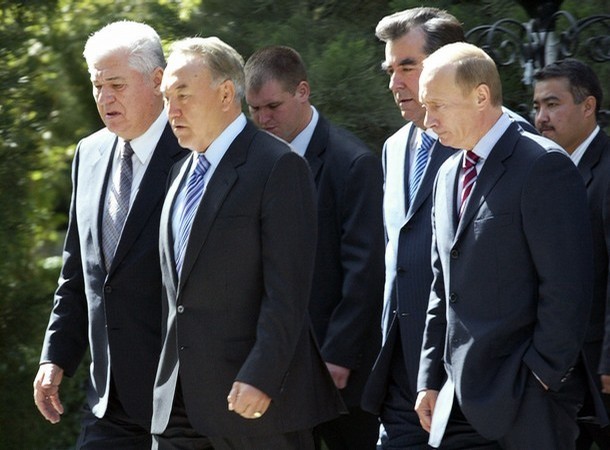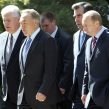
Moscow Struggling to Transform CSTO into a “Russian NATO”
Publication: Eurasia Daily Monitor Volume: 6 Issue: 107
By:

After the war with Georgia last August, Moscow has attempted to transform the Russian-dominated seven-member Collective Security Treaty Organization (CSTO) – a loose alliance that has served mostly as a forum for security consultations – into a military organization that might counterbalance NATO. During the Russian invasion of Georgia, no CSTO ally provided any assistance, or recognized the independence of the Georgian separatist regions of Abkhazia and South Ossetia. In February at a summit in Moscow, the presidents of Russia, Belarus, Armenia, Kazakhstan, Kyrgyzstan, Tajikistan and Uzbekistan announced the creation of a new CSTO rapid-reaction force. President Dmitry Medvedev declared the force will be "adequate in size, effective, armed with the most modern weapons and must be on par with NATO forces" (EDM, February 5). It is well understood in Moscow that even a symbolic military contribution is important politically. It is always better to be heading a coalition of the willing, than to be a lone aggressor.
It was announced that a legally binding agreement to create the Collective Operational Reaction Force or CORF will be signed at the next CSTO summit in Moscow on June 14. Before that, a series of meetings of other senior officials (defense ministers, secretaries of the national security councils and foreign ministers) will finalize the draft documents, prepared by the CSTO Secretariat. According to Russian officials, establishing the CORF as well as further plans to create a large permanent allied armed force in Central Asia will transform the CSTO "into a NATO-like structure." The Russian foreign ministry suggested that the permanent allied armed force in Central Asia will defend the region from "outside aggression" and among other components will include a fleet in the Caspian Sea (Kommersant, May 29).
This week the CSTO defense ministers’ meeting in Moscow ended in failure – there was no agreement on the CORF. The CSTO Secretary-General Nikolai Bordyuzha told journalists that Armenia and Uzbekistan had blocked progress, "with Armenia demanding a more concrete date for when the CORF will become operational." Bordyuzha hoped that "by June 14, just before the summit, everything will be ready for signing by the presidents" (Interfax, June 3).
The Uzbek president Islam Karimov signed the initial CORF agreement in February with reservations, avoiding committing Uzbek forces to a permanent structure, instead participating on a case-by-case basis (Interfax, February 4). Apparently, Tashkent has continued to be skeptical of the potential of the new force. Armenia also sees a genuine external threat with an unresolved conflict with Azerbaijan since the 1990’s over Karabakh, and an uneasy relationship with Turkey. Armenia clearly wants a strong commitment of military aid in a possible crisis – not an open-ended promise to intervene in theory. The Central Asian CSTO countries including Uzbekistan, see internal threats from Islamists and political opponents, but no genuine external threat, at least while the U.S. and NATO remain committed to Afghanistan and the Taliban does not move in force to the borders of former Soviet Central Asia -as occurred in 2000.
The Russian defense ministry announced it is ready to commit the bulk of the CORF troops – the 98th airborne division and the 31st air-assault brigade. There are plans in Moscow to create joint Special Forces within the CORF framework for antiterrorist operations. The CSTO defense ministers were shown Russian-made uniforms and weapons, which the defense ministry hopes they will purchase for their CORF troops – standardizing their appearance and at least promoting a display of interoperability (ITAR-TASS, June 3). Russian officials also hope that Belarus, Kazakhstan and Tajikistan will each commit a brigade together with special units. Kyrgyzstan will be asked to provide a battalion. The Armenian and Uzbek commitment remains unclear (Nezavisimaya Gazeta, June 3).
The Belarusian constitution does not allow the commitment of its troops for combat abroad. In February Minsk angrily rebuffed Moscow, and announced it does not plan to change its law, insisting that its CORF contingent might only be used on Belarusian territory (Kommersant, February 10). Recently, relations between Moscow and Minsk have become more strained (EDM, June 2). Medvedev has described recent critical remarks by Belarusian President Aleksandr Lukashenka as "unacceptable" (Interfax, June 3). Uzbekistan is in a simmering conflict with its CSTO neighbor Tajikistan, and has accused Kyrgyzstan of harboring Islamist terrorists, and closed its border (EDM, May 28).
There are of course constant differences amongst NATO members, but it is hardly the model which Medvedev had in mind, when he first announced plans to create a Russian version of the Atlantic Alliance. There are well-established procedures within NATO to settle differences, but Moscow bureaucrats do not appear to have grasped the notion of patient consensus building.
According to leaks from the CSTO secretariat in Moscow, the grand plans of building the CORF have already been watered down. The CORF troops will remain on national territory and under national jurisdiction. There will be no CORF permanent joint staff or command. The force will be assembled, a commander appointed and a staff created whenever missions are approved by an emergency summit of the CSTO presidents. In the latest example of Moscow-style bureaucracy, it was proposed that the CORF commander will be appointed from the nation on whose territory any operation is conducted (Nezavisimaya Gazeta, June 3). The CORF appears at present to be stillborn -or perhaps Moscow wants any plausible legal framework for possible future intervention in neighboring states placed under the CSTO flag.




